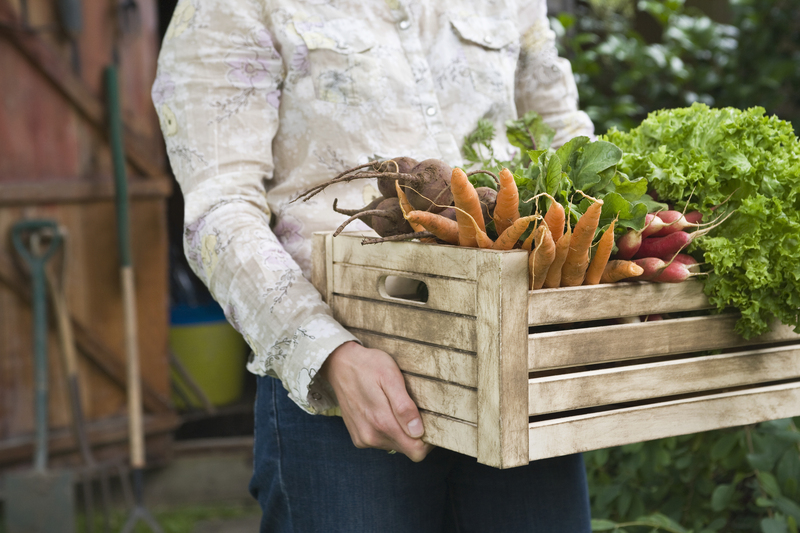Recycling Organic Waste for Fertile Grounds
Posted on 23/08/2025
Recycling Organic Waste for Fertile Grounds: A Comprehensive Guide
Facing increasing concerns about sustainability and soil health, recycling organic waste has emerged as a critical solution for cultivating fertile ground. By converting kitchen scraps, yard clippings, and biodegradable materials into nutrient-rich compost, individuals and communities not only reduce landfill waste but also enrich the soil, enhance crop yields, and contribute to a healthier environment. This comprehensive guide explores the best practices, benefits, and innovations in composting organic waste for soil fertility.

What is Organic Waste and Why is it Important?
Organic waste refers to biodegradable materials derived primarily from plants or animals. Examples include:
- Food scraps (vegetable peels, fruit cores, coffee grounds)
- Yard waste (grass clippings, leaves, small branches)
- Paper products (uncoated paper, napkins, cardboard)
- Manure and agricultural byproducts
Disposing of organic waste in landfills causes a host of problems, including the release of methane, a potent greenhouse gas. By recycling organic waste for fertile grounds, we can turn potential pollutants into valuable resources, supporting ecological cycles and agricultural productivity.
Benefits of Recycling Organic Waste for Soil Fertility
The advantages of transforming organic refuse into fertile soil amendments are numerous:
- Reduces Landfill Waste: Composting diverts significant volumes of trash from landfills, extending their lifespan and reducing environmental impact.
- Builds Healthy Soil: Compost improves soil structure, moisture retention, and fertility by supplying essential nutrients and beneficial microorganisms.
- Supports Plant Growth: Fertile soils lead to healthier crops, vibrant gardens, and stronger trees--with lower reliance on synthetic fertilizers.
- Mitigates Climate Change: Organic recycling slows the production of methane and returns carbon to the soil, helping to offset greenhouse gas emissions.
- Saves Money: Households, farmers, and municipalities save on disposal costs and reduce their need to purchase commercial fertilizers.
How Composting Transforms Organic Waste for Fertile Grounds
Composting is the natural process that breaks down organic matter into dark, crumbly, earthy-smelling "black gold" known as humus. Microorganisms, fungi, insects, and worms all play a role in this transformation, recycling nutrients back into the earth. Composting organic waste creates a closed-loop system, nourishing crops and completing the nutrient cycle.
The Science Behind Composting
Decomposition is driven by aerobic bacteria that consume carbon-rich (brown) materials like dry leaves and nitrogen-rich (green) wastes such as food scraps. Balanced compost piles heat up as microbes feed and multiply, breaking down complex organic compounds into simpler forms plants can use. Within a few months, raw materials are replaced by rich, life-giving compost.
Recycling Organic Waste at Home: Practical Steps for Gardeners
Set Up Your Compost Pile or Bin
- Select a Location: Choose a well-drained, accessible spot in your backyard, garden, or even on a balcony for a compact composter.
- Add Brown and Green Materials: Layer carbon sources (dried leaves, straw, cardboard) with nitrogen sources (kitchen scraps, coffee grounds, grass clippings).
- Manage Moisture: Compost should feel like a wrung-out sponge--not too wet or too dry.
- Turn Regularly: Aerate every few weeks to speed decomposition and prevent odors.
- Monitor and Harvest: In 2 to 6 months, your compost will be dark, crumbly, and ready to use on garden beds or potted plants.
What Can and Cannot Go in Your Compost?
Compostable Materials:
- Fruit and vegetable scraps
- Eggshells
- Tea bags (unbleached)
- Coffee grounds and filters
- Dead flowers, grass clippings, leaves
- Shredded paper and cardboard (uncoated)
- Meat, dairy, oils (attract pests, slow decomposition)
- Pet waste (may contain pathogens)
- Diseased plants or invasive weeds
- Chemically treated wood or glossy paper
Advanced Techniques for Recycling Organic Waste
To maximize fertile ground from organic waste, innovative gardeners and farmers embrace advanced methods, including:
Vermicomposting
This process uses special earthworms (like Eisenia fetida or "red wigglers") to consume and transform kitchen scraps into vermicast, a concentrated organic fertilizer. Worm bins are compact, odorless, and suitable for indoor as well as outdoor use.
Bokashi Composting
Originating in Japan, Bokashi is an anaerobic method that pickles food waste using beneficial microbes found in bran. Unlike traditional composting, Bokashi can accept some meat, dairy, and cooked foods, creating pre-compost that integrates seamlessly with soil.
Hot Composting
By carefully balancing carbon, nitrogen, moisture, and aeration, hot composting "cooks" materials at temperatures of 130-160?F (54-71?C). This rapid decomposition method eliminates pathogens and weed seeds, producing usable compost in as little as 2-4 weeks.
Community and Municipal Organic Waste Recycling Programs
On a larger scale, many cities and towns now operate programs to collect residential and commercial organic waste for composting. Curbside drop-off, green bin collections, and regional composting facilities turn thousands of tons of food scraps and yard debris into soil amendments for community gardens, parks, and farms. Key benefits include:
- Lowering landfill operating costs and greenhouse gas emissions
- Creating local jobs and fostering green industries
- Beautifying public spaces with high-quality compost
- Encouraging citizen participation in sustainability initiatives
Organic Fertilizer from Recycling: The Foundation of Sustainable Agriculture
Nourishing fertile grounds by recycling organic waste is the cornerstone of regenerative agriculture. Compost-amended soils boast higher organic matter, improved microbial diversity, and increased nutrient cycling. These healthy soils support resilient crops, reduce erosion, and help farmers withstand environmental stressors.
Transitioning to organic waste recycling for fertile soils also decreases dependence on chemical fertilizers--a major pollutant of waterways and contributor to climate change. Compost acts as a slow-release fertilizer, delivering nutrients over time and minimizing leaching or runoff.
Challenges in Recycling Organic Waste for Fertility
Despite the obvious advantages, challenges remain when integrating composting into daily life or commercial systems:
- Lack of awareness or education about composting techniques
- Space limitations for urban residents
- Collection infrastructure gaps in some municipalities
- Potential pests or odors from improper management
Tips for Maximizing Soil Fertility from Recycled Organic Waste
- Balance Green and Brown Materials: Aim for approximately 2:1 brown to green ratio to promote speedy, odor-free composting.
- Shred or Chop Wastes: Smaller pieces break down faster--use a shredder, mow yard clippings, or chop kitchen scraps.
- Aerate Often: Use a pitchfork, compost turner, or aerating tool weekly to inject oxygen and prevent compacting.
- Monitor Moisture: If too dry, sprinkle with water or add juicy produce; if too wet, mix in more dry browns.
- Use Finished Compost Generously: Apply to vegetable beds, flower gardens, lawns, and even container plants for a biological boost.

Future Innovations in Organic Waste Recycling for Soil Health
As technology and science advance, new solutions are emerging to make recycling organic waste for fertile grounds even more efficient:
- Smart Composting Systems: IoT sensors monitor temperature, moisture, and microbial activity, optimizing decomposition.
- Biochar Integration: Charred organic matter sequesters carbon for centuries, improves water retention, and acts as a habitat for soil microbes.
- Community Composting Hubs: Urban neighborhoods pool resources and expertise for hyper-local, high-quality compost production.
- Educational Programs: Schools, nonprofits, and governments developing training modules and workshops on composting best practices.
Conclusion: Building a Greener Tomorrow Through Organic Waste Recycling
Recycling organic waste for fertile grounds is a simple yet transformative practice with far-reaching benefits. By reclaiming our food and yard scraps, we restore the natural fertility of soil, mitigate environmental harm, and close vital nutrient loops. Whether you're a home gardener, a farmer, or a concerned citizen, you can play an essential role in fostering soil health through effective organic waste recycling.
To make a lasting impact, start composting today, advocate for local community programs, and share your knowledge about the transformative power of turning waste into a resource. Together, we can build healthier soils--and healthier communities--for generations to come.
Frequently Asked Questions (FAQ) on Recycling Organic Waste for Fertile Grounds
Why should I recycle organic waste instead of sending it to the landfill?
Landfilled organic waste generates methane and wastes valuable nutrients. Composting recycles these nutrients into the soil, boosts fertility, and reduces greenhouse gas emissions.
How long does it take to make compost?
Well-managed piles can yield usable compost in as little as 2-6 months. Hot composting can be even faster--sometimes just a few weeks!
Is home composting possible in small apartments?
Yes! Bin-based systems, worm composting (vermicompost), and even countertop Bokashi buckets enable effective recycling in limited spaces.
Can compost replace chemical fertilizers?
In most gardening and small-farming contexts, mature compost delivers all needed nutrients, improves soil structure, and feeds beneficial soil life--often making chemical fertilizers unnecessary.
What's the best way to get started with recycling organic waste?
Start small--use a countertop compost pail for kitchen scraps, set up a backyard pile or bin, and learn which materials can and can't be composted. Watch your garden thrive as you recycle organic waste for fertile grounds!
Latest Posts
Nurturing a Green Space with Paws and Plants
Weed-Free Gardening: Unlock Three Powerful Control Methods
Achieve Stunning Garden Designs with Hedge Trimming

